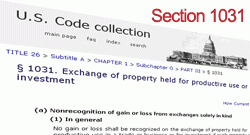BLOG
Like-kind exchange insight: when can exchangers get their proceeds back?

(“Exchangor” or “Taxpayer”) Person intending to conduct a 1031 tax deferred exchange, who transfers a relinquished property and thereafter receives a replacement property. Exchanger s frequently inquire about when they may receive all, or part of their exchange proceeds back. It is a question I have been asked countless times, and in certain circumstances giving the right answer can be difficult. We're talking, after all, about the proceeds from the exchanger's sale, and sometimes the need for their return is pressing. Regardless of the need, though, there are very rigid regulations regarding when qualified intermediaries (QIs) can release a client's exchange proceeds. Those same regulations make no provision for how badly those funds may be needed for purposes outside a properly structured like-kind exchange (LKE).
Given the incredible benefits that LKEs afford and the tight restrictions regarding their application, it's important to understand how and when exchangers can get their proceeds back.
Let's begin with the exchange agreement. Signed at the start of the LKE, the agreement must explicitly state the restrictions on an exchanger's "rights to receive, pledge, borrow, or otherwise obtain the benefits of money, or other property before the end of the exchange period." Within the LKE industry, these limitations are referred to as the (g)(6) limitations, after United States Treasury Regulation 1.1031(k)-(1)(g)(6). The language within a properly worded agreement must be clear, read and understood, prior to execution by the exchanger.
Within a properly written agreement, it is fairly easy to understand the limitations on the exchanger's rights mentioned above. What's not always readily understood is the definition of the exchange period. Officially this period begins on the date the ownership of the relinquished property is legally transferred to the buyer(s) and officially ends with one of the following triggering events:
- The expiration of the 45-day identification period if the exchanger has either,
- failed to identify replacement property(s) or,
- properly revoked the previously submitted identification form, or
- after properly identifying replacement property(s) and without revocation, encounters a "material and substantial" contingency preventing the purchase of the identified replacement property(s), or
- The receipt, by the exchanger, of ALL of the properly identified replacement property(s), or
- At the expiration of the 180-day completion period.
What this means is that the earliest day exchange proceeds may be returned to the exchanger is on day 46. There is simply no avenue available for the exchanger to terminate the LKE and receive the proceeds before the 45 days pass. Furthermore, after proper identification and the passing of the first 45-day deadline, if an exchanger does not purchase the identified replacement property(s), the exchanger must wait until the full 180-day exchange period expires to receive the remaining funds.
(“Exchangor” or “Taxpayer”) Person intending to conduct a 1031 tax deferred exchange, who transfers a relinquished property and thereafter receives a replacement property. Exchanger s should be very careful about claiming that a material and substantial contingency has prevented the purchase of the properly identified replacement property(s). This exemption may only be claimed after identification has been made and the 45-day date has passed. In addition, the proper application of the contingency demands a very careful analysis of the nature and character of the event by an experienced tax advisor. Even within that context, a careful QI will not release funds for a material and substantial contingency without coordinating with its own legal advisor.
In summary, it's very important to know your options before signing an exchange agreement. A QI with a comprehensive approach will explain the (g)(6) limitations in a manner that makes them easily understood. We also strongly encourage you to beware of "overly accommodating accommodators" - a QI who's willing to play fast and loose with the letter of the law is placing your business in jeopardy. Accruit doesn't strictly adhere to the tax code just for our own protection, we do it because it's in your best interests, as well.
As a general rule, always have your tax advisor review the exchange agreement prior to signing. By working together, the QI and the tax advisor will be able to give you a clear picture of all the timing issues related to an LKE.

